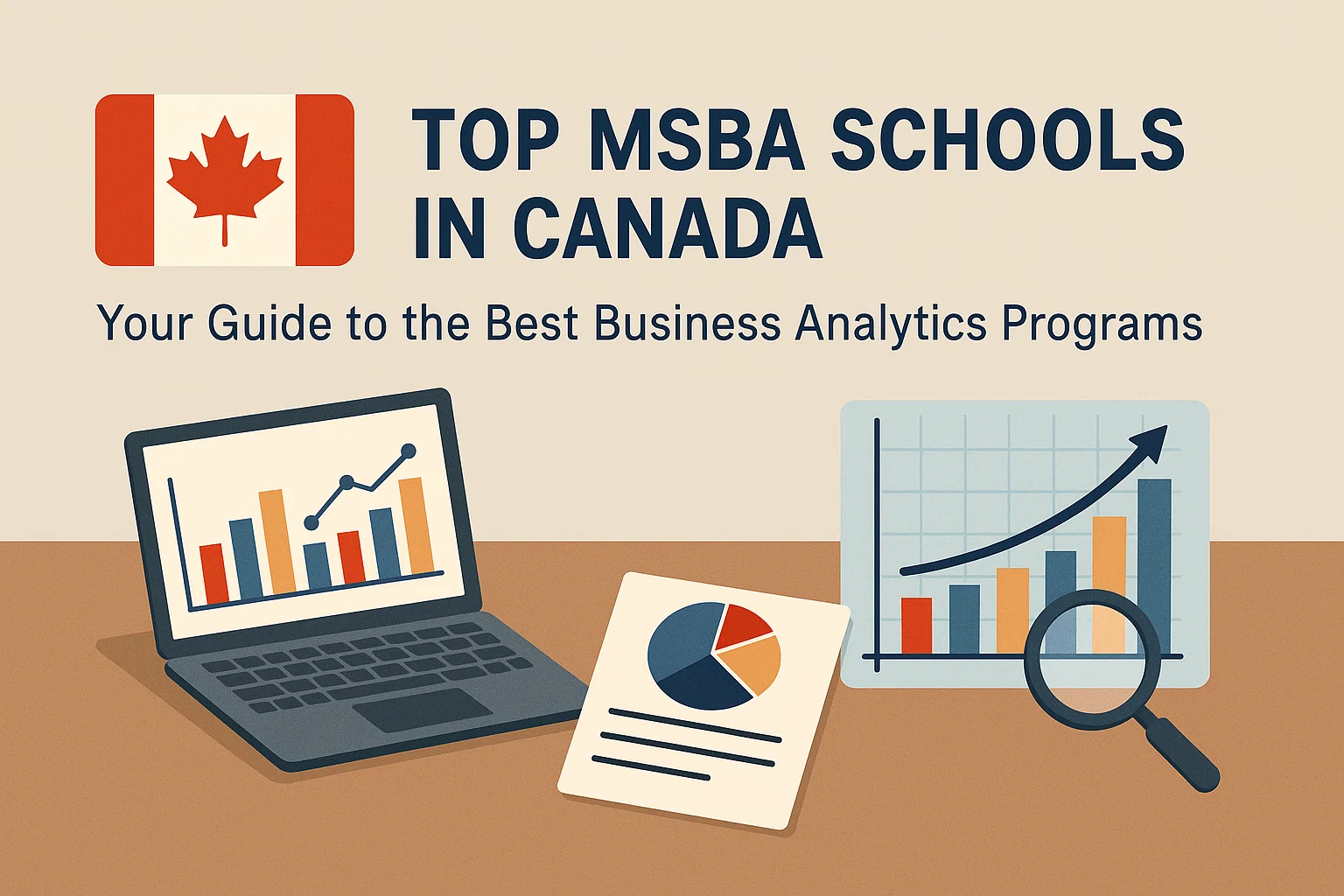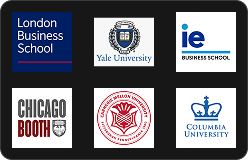
Top MEM Schools in Canada: Your Guide to the Best Programs for 2025
Top MEM Schools in Canada: Your Guide to the Best Programs for 2025Thinking about mixing your engineering background wi…
Table of Contents

Thinking about doing a Master’s in Business Analytics (MSBA)? Canada is one of the best places to do it right now. With tech and data jobs growing fast, and global companies investing in digital skills, business analytics is one of the most in-demand fields in the world.
And Canada? It checks all the boxes:
Whether you’re a recent graduate or a working professional ready for a career switch, Canada’s MSBA programs are built to help you succeed. They're hands-on, job-focused, and tied closely to what companies are actually looking for today.
This guide will show you:
Let’s dive in.
A Master’s in Business Analytics in Canada is not just about crunching numbers—it’s about learning how to use data to solve real business problems.
Most MSBA programs in Canada are STEM-designated and focus on practical, job-ready skills. You’ll study a mix of analytics, business strategy, and tech tools that are widely used by companies around the world.
Here’s what’s usually included in the curriculum:
Canadian business analytics programs are designed to give you hands-on experience:
This practical approach is one reason why MSBA grads are hired quickly—because they already have experience with real-world data and business use cases.
So, why are so many students choosing MS in Business Analytics in Canada over other countries? The answer is simple: Canada offers a rare mix of top-quality education, great job opportunities, and immigration-friendly policies.
Here are the biggest reasons why Canada stands out:
After finishing your MSBA in Canada, you can apply for a 3-year Post-Graduation Work Permit. That’s plenty of time to build experience, find a full-time job, and even apply for permanent residency (PR).
Many masters of business analytics Canada programs are listed under PR-friendly courses in Canada for 2025. That means your degree gives you points for Canadian immigration—making it easier to stay and work long-term.
The best business analytics masters programs in Canada often cost 20–40% less than similar programs in the United States. And you’ll still get a world-class education with top faculty and modern tech labs.
Canadian cities like Toronto, Vancouver, Montreal, and Calgary are global hubs for:
Graduates of MSBA Canada programs regularly land jobs with top employers like RBC, Amazon, Deloitte, Shopify, and the Canadian government.
Canada is one of the safest countries in the world, and its campuses are known for being diverse and welcoming. Whether you're coming from India, China, Nigeria, or anywhere else, you’ll find strong student support services and multicultural communities across all major cities.

With so many great options, choosing the right MSBA program in Canada can feel overwhelming. But if you break it down, it gets a lot easier. Here's what to consider when picking the program that fits you best.
You’ll find business analytics programs in Canada offered by both business schools and general universities.
Pick based on what suits you more—strategy and decision-making, or tech and analytics depth.
Where you study matters. It can impact internships, job interviews, and networking.
| City | Known For |
|---|---|
| Toronto | Finance, Consulting, Tech Startups |
| Vancouver | Tech, AI, Green Tech |
| Montreal | Healthcare, Analytics, Research |
| Calgary & Edmonton | Energy, Retail, Government Data Projects |
Studying close to these hubs gives you better access to job opportunities after graduation.
Programs that offer:
...are often the best business analytics master's programs for career starters. You’ll graduate with work experience, not just a degree.
Don’t want to write the GMAT? Good news: many masters in business analytics Canada without GMAT options are available.
| University | GMAT Requirement |
|---|---|
| York (Schulich) | Not Required |
| UBC | Optional (Recommended) |
| McGill | Optional (Recommended) |
| HEC Montréal | Optional |
| Simon Fraser | Optional |
| Rotman | Required |
| Queen’s (Smith) | Required |
This is where top MSBA Canada programs really shine. Look for:
The best colleges for business analytics in Canada don’t just teach you—they also help you get hired.
Canada has many excellent schools offering MS in Business Analytics, but not all programs are created equal. Based on curriculum quality, internship options, career outcomes, and industry links, here’s our updated list of the top MSBA programs in Canada.
| University | Program Name | Duration | City | Avg. Salary (Post-MSBA) | GMAT/GRE | Internship/Co-op |
|---|---|---|---|---|---|---|
| UBC (Sauder) | Master of Business Analytics | 12 months | Vancouver | N/A | Optional | Yes |
| Toronto (Rotman) | Master of Management Analytics | 11 months | Toronto | CAD 140,289 | Required | Yes |
| York (Schulich) | Master of Business Analytics | 12 months | Toronto | CAD 91,359 | Not Required | Yes |
| McGill (Desautels) | Master of Management in Analytics | 12 months | Montreal | N/A | Optional | Yes |
| Western (Ivey) | MSc in Business Analytics | 16 months | London | CAD 79,487 | Recommended | Yes |
| HEC Montréal | MSc in Data Science and Business Analytics | 24 months | Montreal | CAD 96,400 | Optional | Yes |
| Queen’s (Smith) | Master of Management Analytics | 12 months | Kingston | N/A | Required | Yes |
| Concordia (John Molson) | MSc in Business Analytics | 16–24 months | Montreal | CAD 98,051 | Required | Yes |
| University of Alberta | Master of Management in Analytics | 12–16 months | Edmonton | N/A | Required | Yes |
| Simon Fraser (Beedie) | MBA with Business Analytics Concentration | 16 months | Vancouver | N/A | Optional | Yes |
Tech-focused, 4-month internship, strong placement in consulting and data science. The master of business analytics UBC ranking continues to rise due to its practical approach.
Located in Canada’s financial hub. High average salaries, top employers, and strong employer branding. GMAT required.
Known for its consulting project with real clients. A top option among business analytics in Canada colleges.
Blends business and tech training. Good for students aiming for roles in strategy and analytics.
Ideal for students interested in leadership roles. Heavy focus on real-world problem solving.
One of the most affordable programs, especially for French speakers. Great for roles in big data and research-heavy industries.
Strong analytics and decision-making focus. Small class sizes and personalized support.
Flexible duration, top ROI, strong career support. A favorite in the Quebec region.
Emerging program in a growing tech hub. Affordability is a plus.
MBA program with analytics concentration. Strong connections to British Columbia’s tech ecosystem.
Getting into a top MSBA program in Canada is competitive, but if you're well prepared, it’s totally doable. Whether you’re applying to UBC, Rotman, Schulich, or any other school, here’s what most universities expect from applicants.
If you’re applying as an international student, be sure to also check:
The UBC Master of Business Analytics requirements for international students include submitting proof of English ability and confirming financial readiness to live in Vancouver.

Let’s talk numbers. If you’re planning to study MS in Business Analytics in Canada, it’s important to understand what you’ll pay—and what you’ll get back.
Overall, Canada is more affordable than the U.S. or the UK, but tuition and living costs can still vary a lot depending on the city and school.
| University | Estimated Tuition (CAD) |
|---|---|
| Rotman (University of Toronto) | $67,160 |
| Ivey (Western University) | $55,000 |
| Smith (Queen’s) | $53,000 |
| McGill University | $49,000 |
| UBC Sauder | $44,000 |
| University of Alberta | $40,000 |
| Schulich (York University) | $39,000 |
| Simon Fraser (Beedie) | $36,000 |
| Concordia (John Molson) | $35,000 |
| HEC Montréal | $24,000–$26,000 |
The master of business analytics UBC fees are mid-range but come with a strong ROI, thanks to Vancouver's booming job market.
| City | Monthly Living Costs (CAD) | Yearly Estimate (CAD) |
|---|---|---|
| Toronto | $1,500–$2,200 | $18,000–$26,000 |
| Vancouver | $1,400–$2,000 | $17,000–$24,000 |
| Montreal | $1,000–$1,500 | $12,000–$18,000 |
| Edmonton | $900–$1,400 | $11,000–$17,000 |
| University | Total Estimated Cost | Avg. Post-MSBA Salary | ROI Outlook |
|---|---|---|---|
| Rotman (U of T) | ~$85,000 | CAD 140,289 | Excellent |
| Schulich (York) | ~$60,000 | CAD 91,359 | Very Good |
| Concordia (John Molson) | ~$50,000 | CAD 98,051 | High |
| HEC Montréal | ~$45,000 | CAD 96,400 | Outstanding |
| Ivey (Western) | ~$70,000 | CAD 79,487 | Moderate |
With the 3-year post-graduation work permit and Canada’s stable job market, the return on investment from most MSBA programs is quite strong—especially when you factor in potential PR status and long-term earnings.
One of the best things about doing a Master of Business Analytics in Canada is the job market that waits for you after graduation. Companies are actively looking for people who can turn data into smart business decisions—and Canadian MSBA grads are a great fit for these roles.
Graduates of MSBA programs are hired into roles like:
If you’re aiming to join Canada’s growing digital economy, msba business analytics programs give you the skills to stand out.
| Industry | Example Employers |
|---|---|
| Tech & AI | Amazon, Shopify, IBM Canada, Meta |
| Finance | RBC, TD, Scotiabank, Manulife |
| Retail & E-commerce | Loblaws, Canadian Tire, Hudson’s Bay |
| Consulting | Deloitte, PwC, EY, Accenture |
| Public Sector | Statistics Canada, CRA, Transport Canada |
| Healthcare | McKesson, Health Canada, Pharma startups |
Many schools offer data analyst training in Canada through real client projects, which boosts employability and industry exposure.
Salaries vary depending on your role, location, and experience, but here’s a rough range for MSBA grads in Canada:
| Job Title | Average Salary (CAD/year) |
|---|---|
| Data Analyst | $65,000–$85,000 |
| Business Analyst | $70,000–$90,000 |
| Analytics Consultant | $80,000–$100,000 |
| BI Specialist | $85,000–$110,000 |
| Data Science Associate | $90,000–$120,000 |
According to recent master of business analytics UBC salary data and surveys from Schulich and Rotman, the first-year salary for grads can go as high as CAD 140,000, especially in Toronto or Vancouver.
Here’s the good news for international students:
That’s why many consider this one of the best PR-friendly courses in Canada 2025.
A Master’s in Business Analytics in Canada is a great investment, but it doesn’t have to break the bank. Many universities offer scholarships, entrance awards, and funding support for both local and international students.
Here’s how you can reduce your MSBA tuition and improve your return on investment.
Awarded automatically when you're accepted—based on your GPA, work experience, or leadership.
Given to top-performing students either at admission or during the program.
Some universities offer 5–10% tuition discounts if you apply before a certain deadline.
You may qualify for these by submitting proof of financial need (bank statements, personal letters, etc.).
More common in MSc or research-based programs, but occasionally available for MSBA students as teaching or research support roles.
| University | Scholarship Name | Type |
|---|---|---|
| UBC Sauder | International Major Entrance Scholarship | Entrance (Merit-Based) |
| Rotman (U of T) | Rotman Excellence Award | Merit-Based |
| York (Schulich) | Schulich Entrance Scholarships | Entrance & Need-Based |
| HEC Montréal | Merit Scholarships | Academic & Diversity |
| Queen’s (Smith) | Smith School Scholarships | Academic Excellence |
| Concordia (John Molson) | International Tuition Awards | Need-Based & Program-Specific |

Yes—you absolutely can.
Many of the top MSBA schools in Canada have moved toward test-optional admissions, especially in recent years. This makes it easier for students from diverse academic or professional backgrounds to apply without standardized test scores.
| University | GMAT/GRE Requirement |
|---|---|
| York University (Schulich) | Not Required |
| HEC Montréal | Optional |
| McGill University | Optional (Recommended) |
| UBC Sauder | Optional (Recommended) |
| Simon Fraser (Beedie) | Optional |
| Concordia (John Molson) | Required (some flexibility) |
| University of Alberta | Required |
| Queen’s (Smith School) | Required |
| Rotman (University of Toronto) | Required |
| Western (Ivey) | Recommended |
If you’re looking for masters in business analytics Canada without GMAT, start with Schulich, McGill, UBC, and HEC Montréal.
Even if you skip the GMAT, you still need to show that you’re ready for the academic challenge. Here’s what schools look for instead:
Whether you’re applying to UBC, Rotman, Schulich, or any of the top MSBA programs in Canada, competition is tough—but you can stand out with the right strategy.
Here’s how to give your MSBA application a serious edge.
Even if you’re from a non-technical background, showing that you’ve learned tools used in MSBA courses helps a lot.
Start learning:
Mention any online certifications on your resume and in your SOP.
Academic and personal projects can make your application stronger.
Admissions teams can tell if you're using a generic template.
Pick people who can talk about:
Don’t just go for the most “senior” person—choose someone who actually knows your work.
MSBA programs in Canada love applicants who:
Even a short story about how you handled change, conflict, or culture shock can go a long way.
If you have time before applying:
Absolutely—if you’re looking to build a future in data and business, a Master’s in Business Analytics in Canada is one of the smartest moves you can make.
Let’s recap why:
But don’t choose a program just based on rankings. The top MSBA programs each offer different strengths—some are more technical, others more business-focused. Some are located in tech hubs like Vancouver, while others give you access to financial giants in Toronto.
Before applying, make sure to:
Whether you're considering UBC MSBA, Rotman, Schulich, or another top school, your journey toward a global career in analytics can absolutely start in Canada.
